

Charles Perkins - Brief biography. Aboriginal Activist, Born 1936, Alice Springs NT, Died 2000 The first Aboriginal Australian to graduate from university, Charles Perkins was also one of the most controversial of Indigenous leaders.
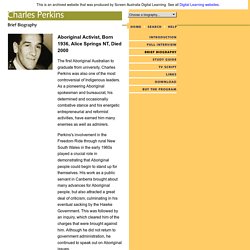
As a pioneering Aboriginal spokesman and bureaucrat, his determined and occasionally combative stance and his energetic entrepreneurial and reformist activities, have earned him many enemies as well as admirers. Perkins's involvement in the Freedom Ride through rural New South Wales in the early 1960s played a crucial role in demonstrating that Aboriginal people could begin to stand up for themselves. His work as a public servant in Canberra brought about many advances for Aboriginal people, but also attracted a great deal of criticism, culminating in his eventual sacking by the Hawke Government. This was followed by an inquiry, which cleared him of the charges that were brought against him. This program explores the personal experiences that fuelled his restless energy. Charles Perkins - Download Video. Video on this site requires the QuickTime player version 4.1 or higher which is available free of charge.
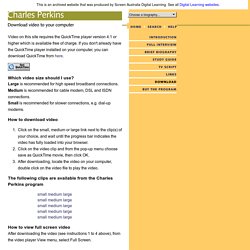
If you don't already have the QuickTime player installed on your computer, you can download QuickTime from here. Which video size should I use? Large is recommended for high speed broadband connections. Medium is recommended for cable modem, DSL and ISDN connections. Small is recommended for slower connections, e.g. dial-up modems. How to download video Click on the small, medium or large link next to the clip(s) of your choice, and wait until the progress bar indicates the video has fully loaded into your browser.Click on the video clip and from the pop-up menu choose save as QuickTime movie, then click OK.After downloading, locate the video on your computer, double click on the video file to play the video.
Freedom Ride: 24/02/2015, Behind the News. Fifty years ago a bunch of Sydney uni students made history by travelling around New South Wales on a bus to protest against racial discrimination.
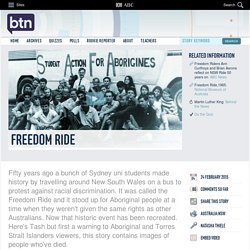
It was called the Freedom Ride and it stood up for Aboriginal people at a time when they weren't given the same rights as other Australians. Now that historic event has been recreated. Here's Tash but first a warning to Aboriginal and Torres Strait Islanders viewers, this story contains images of people who've died. This was Australia in the 1960s. Colour TV wasn't invented yet and this was the most popular boy band around!
But this guy Charles Perkins wanted to change that. For two weeks they travelled to outback towns and found Aboriginal people living in poor conditions. 50 years on, many of the people from the original Freedom Ride are still around today. SKYE: Hi BtN, it's Skye here and I'm on the Freedom Ride to get a better understanding of what really happened in 1965. Australian Institute of Aboriginal and Torres Strait Islander Studies. The students that made up SAFA came from many different existing societies including the Australian Labor Party (ALP), the Newman society, the Jewish Students Union and the Civil Liberties Association.
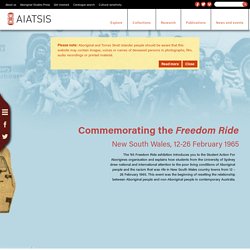
Led by Charles Perkins there were around 35 students that took part in the Freedom Ride. Note: Ages are sometimes approximate, and both age and enrolment in university courses are for February 1965. Leading the Freedom Ride in 1965 - ABC online education. Charles Perkins campaigns for Aboriginal rights - ABC online education. CHARLES PERKINSMadam Chairman, ladies.
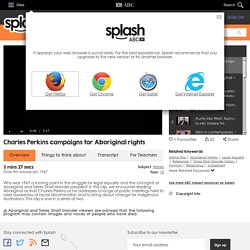
It's my pleasure, of course, to be here today to address you on a question that you all may be reasonably unaware of, you don't really know the full facts about. And I hope that I can, in this short space of 20-25 minutes or a little more, give you some idea on what are the problems involved as far as Aboriginal people are concerned here in Australia, and the possibilities of solutions to these problems.CHARLES PERKINSFirstly, the Aborigines are an Australoid people racially, of Australoid stock.
They were supposed to have come from southern India about 20,000 years ago and inhabited this continent. It's significant to note that after 20,000 years of inhabiting this continent, this country, this great country, that the Aboriginal people do not own, by right, not one square inch of land in this country.